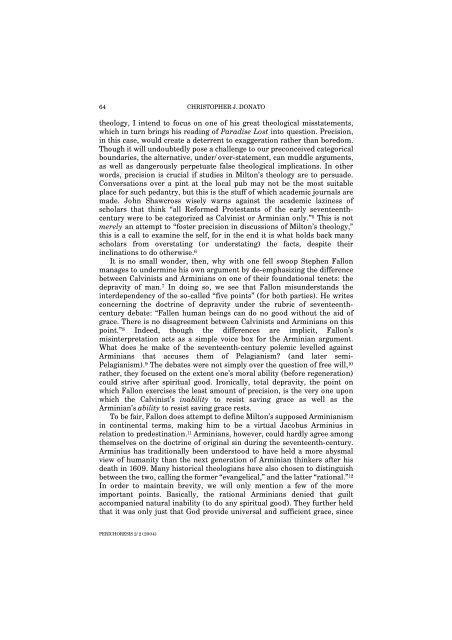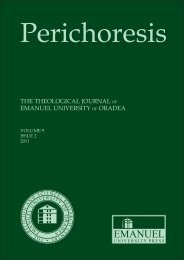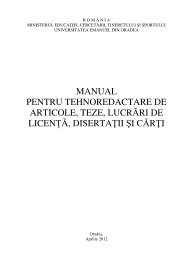Paradise Lost - Universitatea "Emanuel"
Paradise Lost - Universitatea "Emanuel"
Paradise Lost - Universitatea "Emanuel"
Create successful ePaper yourself
Turn your PDF publications into a flip-book with our unique Google optimized e-Paper software.
64<br />
PERICHORESIS 2/2 (2004)<br />
CHRISTOPHER J. DONATO<br />
theology, I intend to focus on one of his great theological misstatements,<br />
which in turn brings his reading of <strong>Paradise</strong> <strong>Lost</strong> into question. Precision,<br />
in this case, would create a deterrent to exaggeration rather than boredom.<br />
Though it will undoubtedly pose a challenge to our preconceived categorical<br />
boundaries, the alternative, under/over-statement, can muddle arguments,<br />
as well as dangerously perpetuate false theological implications. In other<br />
words, precision is crucial if studies in Milton’s theology are to persuade.<br />
Conversations over a pint at the local pub may not be the most suitable<br />
place for such pedantry, but this is the stuff of which academic journals are<br />
made. John Shawcross wisely warns against the academic laziness of<br />
scholars that think “all Reformed Protestants of the early seventeenthcentury<br />
were to be categorized as Calvinist or Arminian only.” 5 This is not<br />
merely an attempt to “foster precision in discussions of Milton’s theology,”<br />
this is a call to examine the self, for in the end it is what holds back many<br />
scholars from overstating (or understating) the facts, despite their<br />
inclinations to do otherwise. 6<br />
It is no small wonder, then, why with one fell swoop Stephen Fallon<br />
manages to undermine his own argument by de-emphasizing the difference<br />
between Calvinists and Arminians on one of their foundational tenets: the<br />
depravity of man. 7 In doing so, we see that Fallon misunderstands the<br />
interdependency of the so-called “five points” (for both parties). He writes<br />
concerning the doctrine of depravity under the rubric of seventeenthcentury<br />
debate: “Fallen human beings can do no good without the aid of<br />
grace. There is no disagreement between Calvinists and Arminians on this<br />
point.” 8 Indeed, though the differences are implicit, Fallon’s<br />
misinterpretation acts as a simple voice box for the Arminian argument.<br />
What does he make of the seventeenth-century polemic levelled against<br />
Arminians that accuses them of Pelagianism? (and later semi-<br />
Pelagianism). 9 The debates were not simply over the question of free will, 10<br />
rather, they focused on the extent one’s moral ability (before regeneration)<br />
could strive after spiritual good. Ironically, total depravity, the point on<br />
which Fallon exercises the least amount of precision, is the very one upon<br />
which the Calvinist’s inability to resist saving grace as well as the<br />
Arminian’s ability to resist saving grace rests.<br />
To be fair, Fallon does attempt to define Milton’s supposed Arminianism<br />
in continental terms, making him to be a virtual Jacobus Arminius in<br />
relation to predestination. 11 Arminians, however, could hardly agree among<br />
themselves on the doctrine of original sin during the seventeenth-century.<br />
Arminius has traditionally been understood to have held a more abysmal<br />
view of humanity than the next generation of Arminian thinkers after his<br />
death in 1609. Many historical theologians have also chosen to distinguish<br />
between the two, calling the former “evangelical,” and the latter “rational.” 12<br />
In order to maintain brevity, we will only mention a few of the more<br />
important points. Basically, the rational Arminians denied that guilt<br />
accompanied natural inability (to do any spiritual good). They further held<br />
that it was only just that God provide universal and sufficient grace, since




